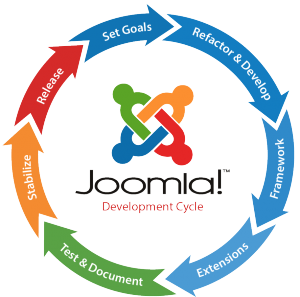Joomla is an open-source CMS, written in PHP programming language, whose purpose is to make it easy to publish and manage web content. It is completely free to use and run entirely by volunteers. It enables users to keep their online content up to date, without having to know how to code. With more than 88 million downloads since November 2016, it is the second most popular content management system, after WordPress.
It emerged in 2005, after a split within Mambo over Mambo’s violation of the open source values. Core development team members abandoned Mambo to regroup under the name “Open Source Matters”, changing their name to Joomla! later that year. Since then, there have been three major versions of the software. Their dedication to open source is expressed in the very name itself, since it is the anglicised spelling of “jumla”, meaning “all together” in Swahili.
Joomla has received a number of awards, the most recent being CMS Critic People’s Choice Award for the Best Free CMS, which they won three years in a row, from 2015 to 2017.
It is an object-oriented software that uses PostgreSQL database to store web content such as images, text, links, etc, thus separating content from the design. This makes it much easier to make changes in the look of your website, by using templates for design that you can apply on all pages at the same time, instead of doing it page by page.
Joomla has an excellent choice of free templates for changing the design, that will make your website look professional in no time.
The best way to start with Joomla is by signing up for an official demo site at Joomla website, powered by SiteGround. All you need to do is come up with a unique name for your website and a strong password for security. It all takes less than two minutes! You can also install Joomla manually on your desktop.
Joomla has five main types of extensions: components, modules, plugins, templates and languages. Some of the great components that will make your site building a lot easier include banners, contacts, newsfeed, tags, galleries, smart search, etc.
Joomla is an excellent choice for larger websites, because of its comprehensive navigation system. However, managing content on Joomla! requires some training, especially when making design changes or extensive updates.
Joomla boasts easy installation procedure, mobile-friendliness, great technical support and a very active online community, SEO friendly URLs and thousands of free templates and plugins. It is a bit more difficult to master than WordPress, but it also offers more options for advanced users. Beginners should not be intimidated by the multitude of functions, and a user interface that looks complicated at first glance, because they will get all the knowledge they need with Joomla’s free video training.
All in all, Joomla is an inexpensive way to make an advanced, good-looking website for the multitude of purposes, from personal websites, blogs, online magazines and organizational websites, to e-commerce, business and corporate portals, and beyond.